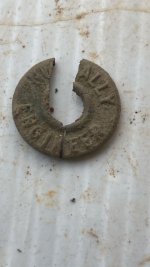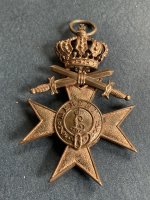jfreakofkorn
Hero Member
Canada finds one of two British explorer ships that vanished in the Arctic more than 160 years ago | Mail Online
Photo(s) in link provided ....
One of two British explorer ships that vanished in the Arctic more 160 years ago has been found, Canadian Prime Minister Stephen Harper announced on Tuesday.
The HMS Erebus and HMS Terror, which were led by British Arctic explorer Sir John Franklin and were carrying 128 hand-picked officers, were last seen in the late 1840s as they searched for the fabled Northwest Passage.
In 2008, Canada announced it would search for the ships in a bid to assert its sovereignty over the passage, which was found during searches for the missing ships.
The wreckage was confirmed by Parks Canada on Sunday using a remote underwater vehicle in the Victoria Strait near King William Island, Nunavut.
Harper, speaking in Ottawa on Tuesday, said it remains unclear which of the two ships has been found, but images show there is enough information to confirm it's one of the pair.
'This is truly a historic moment for Canada,' said Harper, who was beaming, uncharacteristically. 'This has been a great Canadian story and mystery and the subject of scientists, historians, writers and singers so I think we really have an important day in mapping the history of our country.'
He added: 'Finding the first vessel will no doubt provide the momentum – or wind in our sails – necessary to locate its sister ship and find out even more about what happened to the Franklin Expedition’s crew.'
Franklin and 128 hand-picked officers and men vanished on an expedition begun in 1845 to find the fabled Northwest Passage.
While no one knows for sure exactly what happened to the crew, experts believe the ships were lost in 1848 after they became locked in the ice near King William Island and that the crews abandoned them in a hopeless bid to reach safety.
Reports at the time from local Inuits say the men, desperate for food, resorted to cannibalism before they perished, the BBC reported.
The failure of the expedition was a huge event in England in the mid-19th century; The Globe and Mail likened it to a moon landing gone wrong today.
Franklin's vessels are among the most sought-after prizes in marine archaeology, and Harper said the discovery would shed light on what happened to Franklin's crew. Tantalizing traces have been found over the years, including the bodies of three crewmen discovered in the 1980s.
The bodies of two English seamen - John Hartnell, 25, and Royal Marine William Braine, 33 - were exhumed in 1986. An expedition uncovered the perfectly preserved remains of a petty officer, John Torrington, 20, in an ice-filled coffin in 1984.
Franklin's disappearance prompted one of history's largest and longest rescue searches, from 1848 to 1859, which resulted in the passage's discovery. The original search for the ships helped open up parts of the Canadian Arctic for discovery back in the 1850s.
The route runs from the Atlantic to the Pacific through the Arctic archipelago. European explorers sought the passage as a shorter route to Asia, but found it rendered inhospitable by ice and weather.
With the melting Arctic ice now unlocking the shipping route Franklin was after, Harper's government searched for the ship in order to stake a claim on the passage.
Sunday's discovery came shortly after a team of archaeologists found a tiny fragment from the Franklin expedition. Searchers discovered an iron fitting that once helped support a boat from one of the doomed expedition's ships in the King William Island search area.
The search for an Arctic passage to Asia frustrated explorers for centuries, beginning with John Cabot's voyage in 1497. Eventually it became clear that a passage did exist, but was too far north for practical use.
Cabot, the Italian-British explorer, died in 1498 while trying to find it and the shortcut eluded other famous explorers including Henry Hudson and Francis Drake. No sea crossing was successful until Roald Amundsen of Norway completed his trip from 1903-1906.
Photo(s) in link provided ....
One of two British explorer ships that vanished in the Arctic more 160 years ago has been found, Canadian Prime Minister Stephen Harper announced on Tuesday.
The HMS Erebus and HMS Terror, which were led by British Arctic explorer Sir John Franklin and were carrying 128 hand-picked officers, were last seen in the late 1840s as they searched for the fabled Northwest Passage.
In 2008, Canada announced it would search for the ships in a bid to assert its sovereignty over the passage, which was found during searches for the missing ships.
The wreckage was confirmed by Parks Canada on Sunday using a remote underwater vehicle in the Victoria Strait near King William Island, Nunavut.
Harper, speaking in Ottawa on Tuesday, said it remains unclear which of the two ships has been found, but images show there is enough information to confirm it's one of the pair.
'This is truly a historic moment for Canada,' said Harper, who was beaming, uncharacteristically. 'This has been a great Canadian story and mystery and the subject of scientists, historians, writers and singers so I think we really have an important day in mapping the history of our country.'
He added: 'Finding the first vessel will no doubt provide the momentum – or wind in our sails – necessary to locate its sister ship and find out even more about what happened to the Franklin Expedition’s crew.'
Franklin and 128 hand-picked officers and men vanished on an expedition begun in 1845 to find the fabled Northwest Passage.
While no one knows for sure exactly what happened to the crew, experts believe the ships were lost in 1848 after they became locked in the ice near King William Island and that the crews abandoned them in a hopeless bid to reach safety.
Reports at the time from local Inuits say the men, desperate for food, resorted to cannibalism before they perished, the BBC reported.
The failure of the expedition was a huge event in England in the mid-19th century; The Globe and Mail likened it to a moon landing gone wrong today.
Franklin's vessels are among the most sought-after prizes in marine archaeology, and Harper said the discovery would shed light on what happened to Franklin's crew. Tantalizing traces have been found over the years, including the bodies of three crewmen discovered in the 1980s.
The bodies of two English seamen - John Hartnell, 25, and Royal Marine William Braine, 33 - were exhumed in 1986. An expedition uncovered the perfectly preserved remains of a petty officer, John Torrington, 20, in an ice-filled coffin in 1984.
Franklin's disappearance prompted one of history's largest and longest rescue searches, from 1848 to 1859, which resulted in the passage's discovery. The original search for the ships helped open up parts of the Canadian Arctic for discovery back in the 1850s.
The route runs from the Atlantic to the Pacific through the Arctic archipelago. European explorers sought the passage as a shorter route to Asia, but found it rendered inhospitable by ice and weather.
With the melting Arctic ice now unlocking the shipping route Franklin was after, Harper's government searched for the ship in order to stake a claim on the passage.
Sunday's discovery came shortly after a team of archaeologists found a tiny fragment from the Franklin expedition. Searchers discovered an iron fitting that once helped support a boat from one of the doomed expedition's ships in the King William Island search area.
The search for an Arctic passage to Asia frustrated explorers for centuries, beginning with John Cabot's voyage in 1497. Eventually it became clear that a passage did exist, but was too far north for practical use.
Cabot, the Italian-British explorer, died in 1498 while trying to find it and the shortcut eluded other famous explorers including Henry Hudson and Francis Drake. No sea crossing was successful until Roald Amundsen of Norway completed his trip from 1903-1906.






